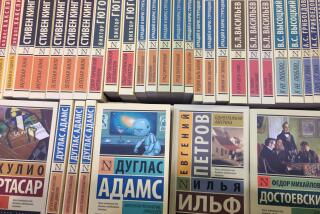‘Calling Off the Cold War’
- Share via
The explanation of the dynamics of the Cold War offered by William Pfaff (Opinion, Nov. 3), “To Call Off the Cold War,” is naive at best. As Pfaff would have us see it, the West would be only too happy to call off the Cold War and settle down to the much-to-be-preferred task of making money if the Soviet Union, in its blind commitment to the Marxist interpretation of history, would stop meddling in the world.
This distinction between “making money” and “making Cold War” is false: In making Cold War the United States is making money. Since World War II it has been recognized that high military spending is the means par excellence of stimulating the system of state-subsidized capitalism that has evolved in the United States. Weapons design and manufacture have a built-in obsolescence factor, ever necessitating new designs and new production. Thus, a large segment of American industry has become dependent on government-induced production, and in the process reaps not a few profits.
Of course, this military spending must be justified to the American public; hence, the “Soviet/Communist threat.” If the Soviets did not exist, we would have to invent them. Furthermore, not only does the Soviet threat provide a rationale for military spending, but it also provides a cover for U.S. intervention in Third World nations to bring or maintain these countries within the U.S. economic sphere.
Pfaff notes that the Soviet Union “cannot forcibly suppress national movements and independent political life in Afghanistan and the East European countries and expect the rest of the world to believe its protestations of peace.” In the same vein, the United States cannot support military dictatorships and cannot intervene in countries whose electoral results are contrary to U.S. economic interests (a recurring pattern in U.S.-Latin American relations) and expect the world to believe its protestations of support for democracy and freedom.
A final point remains. Pfaff notes correctly that “Star Wars” is not so much a military threat to the Soviet Union as it is an economic and social one, and points out that reducing military expenditure could markedly improve the lives of the Soviet people. The same applies to the United States.
Neither the Soviet Union nor the Third World has a monopoly on poverty. More than 10% of Americans live in poverty, with the rate much higher among blacks and Hispanics. Further, the staggering deficit created by the current Administration’s “defense” budgets has served as the perfect justification for cutting back or eliminating entirely many of the social services on which the nation’s poor depend. And this is pre-”Star Wars.” The costs of the Cold War are already killing people. Unless we change radically the course that we are following, it will kill us all.
PAULA KEMPCHINSKY
CARLOS P. OTERO
Los Angeles
More to Read
Sign up for Essential California
The most important California stories and recommendations in your inbox every morning.
You may occasionally receive promotional content from the Los Angeles Times.













